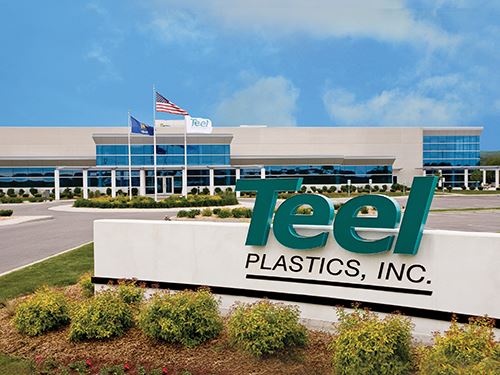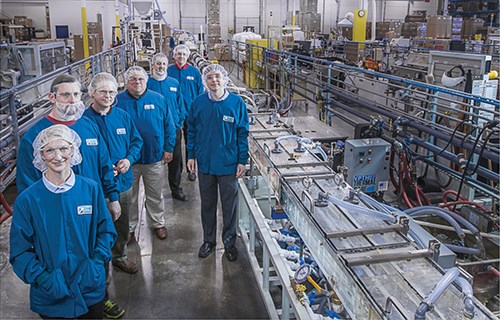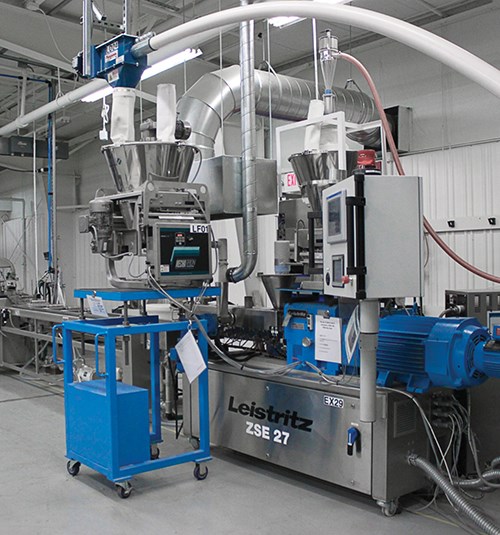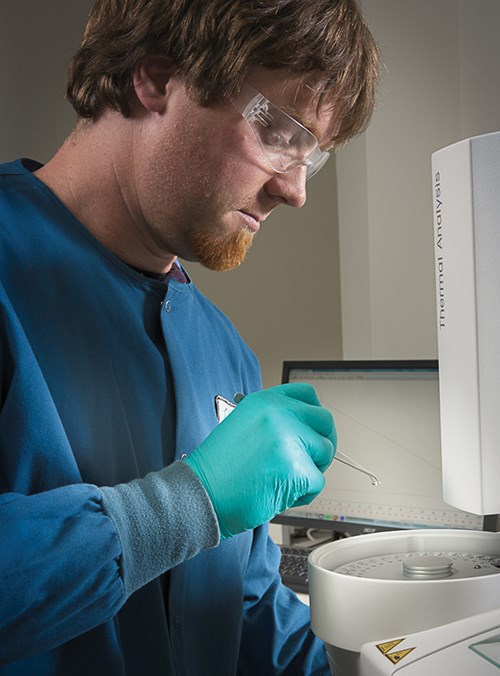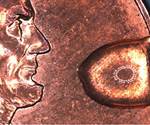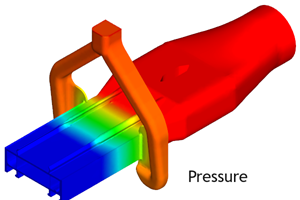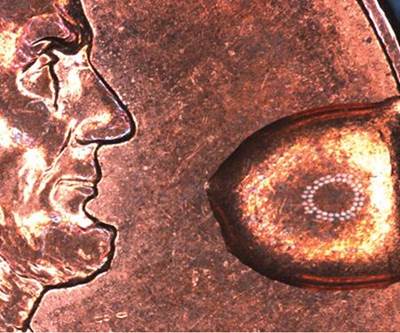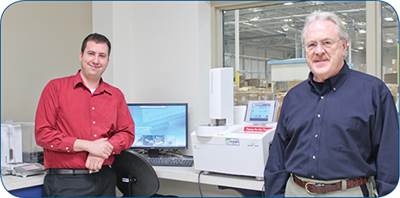Teel Plastics: Where Science, Tech, Quality and Innovation Meet
This family-owned custom profile and tubing business controls its own destiny by controlling, well, everything.
Family-ownership … advanced automation … quality- and customer-centric … diverse … new-technology driven … science-based: These are among the attributes of Teel Plastics Inc., an extruder of tubing and profiles headquartered in a meticulous 150,000 ft² facility in Baraboo, Wis., about 40 miles north of Madison and one of three facilities Teel operates in Baraboo. This processor leaves nothing to chance: It formulates and compounds much of what it processes, builds much of its tooling and even some post-production machinery, is engineering its own quality-control software, is a staunch advocate of continuous improvement, and runs a first-class analytical lab to ensure its products meet or exceed customer expectations.
“The breadth and depth of the technology we offer is a competitive advantage we bring to the markets we serve,” states Jay L. Smith, Teel chairman and part of the family ownership group that includes daughter Brynna London and son Jason Smith, both of whom also work for the firm.
Teel’s roots go back to 1951, when it was founded by the Teelin family as Insemikit Co. Back then, Insemikit made agricultural implements and tools out of glass for the veterinary and emerging livestock artificial-insemination industry. In short order, the company saw markets shifting from glass to plastics, and in 1958 Insemikit changed its name to Teel Plastics Inc. Around that time, Teel also started making leak-proof sampling bags used by laboratories around the world (the kind you’d see on any CSI show)—still a major product of the company.
Even in the early stages of the company, “meeting customer needs” was a core value of Teel, one that to this day drives the company’s culture of pushing for continuous improvement and developing skilled and experienced employees dedicated to fostering long-term customer relationships with customers and suppliers alike.
Smith and family bought the company in 1999. By then, it was already ISO 9001 certified. But the new owners saw more potential for growth. They instituted a four-pronged strategic direction focusing on talent, supply-chain management, customer-focused innovation, and continuous improvement. The Smiths also introduced Teel to a “stage-gate” product-development process that basically has the processor “lead the customer through our entire process and guide them through our systems,” Jay Smith says, in order to expedite the development cycle.
In 2006, Teel got serious about lean manufacturing. Lean technique training was conducted through classroom and practical workshops for all employees across every position. The lean culture is based on the philosophy of measured business metrics driving improvements in 13 critical performance elements.
NEW FACILITY
Teel broke ground on its new headquarters—one of three in Baraboo—in 2007. The new building is organized in a way that supports the processor’s commitment to lean—and green—manufacturing. For example, there is no central tool crib in the building. Each of the 30+ extrusion lines in the plant—1- to 3.5-in. single-screw extruders, mostly from Davis-Standard, Pawcatuck, Conn., as well as three conical twins sized 35 and 65 mm from Milacron, Batavia, Ohio,—have immediate access to tools and other resources right at the line. The building was also built to accommodate future growth.
The new building’s design started with a green concept using less energy and resources while providing an improved work environment for employees. “We have ongoing relationships with quite a few Fortune 500 companies,” Smith says. “Many of them come in here for audits, and most leave telling us that our facility and systems are state-of-the-art.”
The new facility operates on a 24-5 basis. The production floor is temperature controlled and virtually free of humidity, which not only makes things comfortable for employees, but takes out the seasonal influences that can wreak havoc with even the most stringent of process-control systems.
Eight outdoor material silos, which comprise about 80% of the resin Teel runs yearly, feed a centralized drying and conveying system supplied by Novatec Inc., Baltimore. While Teel runs a variety of hygroscopic materials that absolutely require drying, it also dries—or preheats—materials such as high-impact polystyrene to reduce surface moisture and lessen the energy load required of its extruders.
The central drying system is complemented by a handful of machine-mounted dryers from Matsui America, Hanover Park, Ill., which are used on multi-layer products in which a small batch of material needs to be dried. The extrusion lines can accommodate up to eight different components, with gravimetric blending systems supplied by AEC, Schaumburg, Ill. Teel’s products run from one to seven layers.
The new building also has a central chilling system supplied by Thermal Care, Niles, Ill. The system is redundant, consisting of three pumps—one running, one backup, and a third for emergencies. Heat exchangers are used on each line to ensure that cooling tanks on the lines are furnished with chilled water. The setup has allowed Teel to reduce its water consumption by an astounding 80%, to about 65,000 gal/day.
On average, Teel has one operator running three lines. Teel uses either atmospheric, open water tanks, or vacuum calibration sizing, depending on end-product requirements. Tanks are furnished mainly by Conair, Cranberry Township, Pa..
Cutting is generally done in-line, with fly-knife cutters and saws for cutting in sizes ranging from 0.05 in. to 10 in. The company also uses planetary rotary cutters. Cutter suppliers include Conair; RDN Mfg., Bloomingdale, Ill.; and G.F. Goodman & Sons, Warminster, Pa. Lines are all equipped with closed-loop gauging systems.
During Plastics Technology’s visit, Teel was running an HDPE tube with 64 hollows on it. After a lengthy cooling and pulling process, the tube was cut by a Goodman cutter at a rate of 38 cuts/sec to create a product about the size of a nickel that is used in waste-water treatment. The die is so complex that Teel had to develop new technology just to clean it. On this particular line, the cooling tank and calibrators were built in house. At Teel, production runs can last anywhere from 4 hr to 3-4 weeks.
QUALITY AND IMPROVEMENT COMMITMENT
A commitment to quality and continuous improvement has also been enhanced since the Smith family took over. In 2003 the Quality Management System was certified to the ISO 9001:2000 standard. In 2009 the Quality Management System was certified to the ISO 9001: 2008 revision. “We make 1200 different part numbers a year and run more than 50 different resins,” explains Joel Soenksen, director of quality. “We are in a make-to-order business, and that part number is the ‘core’ that drives our quality system. The ISO system documentation is 2000 pages. Each customer order has a new lot record assembled every time we get an order. We have employees who, as the result of our own computer-based training program, are process experts and can achieve the status of ‘certified operator.’ They have established standards and procedures for extrusion and everything we do post-production.” Every product has a setup sheet associated with it so manufacturing personnel can make it under the same conditions each time.
“Every part number is managed by statistical process control,” Soenksen continues. “We lived with an off-the-shelf system for years but when we came to the realization that it didn’t have the capabilities to fit our needs, we built our own.”
In 2010, Teel started a new division, Teel Analytical Laboratories. Three years later, the lab received certification to the ISO 17025 standard for analytical labs. The certification, which was obtained from Perry Johnson Laboratory Associates, marks the organization as a first-class laboratory in the area of material science and polymer analysis. Teel Analytical Laboratories offers confidential analysis services and consulting with a focus on polymer analysis.
Teel projects its 2014 sales to exceed $50 million, more than twice the level they were at when the Smiths came in. The business is deep and wide: Custom products for the healthcare sector focus on personal hygiene, medical packaging, and medical device components. Industrial products include water filtration, automotive, converting industry, and packaging. Consumer products include cosmetics and pencils.
Teel also does its own custom compounding to support its processing operations and offers toll compounding services as well, relying on a 27-mm twin-screw corotating extruder furnished by Leistritz, Somerville, N.J.
Teel’s compounding operations focus on natural fibers and barrier formulations. The company has experience compounding wood fiber, rice hulls, coconut shells, flax, and more in a variety of resin systems. Its custom natural-fiber compounds have been used for everything from specialty cosmetic packaging to structural components in buildings.
On the barrier side, Teel has developed a line of high-performance materials for applications ranging from protective barriers against contamination, adhesive tie layers between two incompatible polymers, oxygen barriers to maintain or increase the shelf life of a product, and permeation barriers to various gases, liquids, or vapors with which the product may be associated.
States Steve Schick, director of new product and process development, “We installed our compounding line after we built the lab. We had experienced a supply-chain failure where a particular resin wasn’t delivered on time, was expensive, and was difficult to process consistently. That was obviously not satisfactory, so we brought compounding in-house. Adding this function has given us another tool to develop proprietary formulations with unique and specific performance properties, and to do so more quickly than would be possible by outsourcing.”
Schick continues, “We have an open platform with customers. This helps us understand their needs, and as a result puts us in a better position to take ownership of a project and develop innovative solutions. A new project generally starts with sales and marketing. From there, our own team of process, mechanical, and package engineers get together.
“We rely on 3D software from Solidworks to start the part- and tool-design process,” Schick continues. “About 80% of the tools are built in house. We have the lab now to review the specifications of the material or blend we think will work. If necessary, we’ll formulate the material and compound it ourselves. Then we’ll provide the customer with three to five product mockups. The customer knows what they want, and we have the full, thought-out processes and procedures to get them there.”
EXTENSIVE CAPABILITIES
Teel’s diverse product line and its participation in a wide range of markets helped insulate it from the severe economic downturn in 2008-2010, Jay Smith notes. This diversity also helps improve quality, notes Soenksen, as best standards and practices employed on one product or project can usually be applied to another. Soenksen explains, “If we’re in a market, we’re deeply into it and driving innovation.”
Teel is also not shy about going outside Baraboo in an effort to help it keep pace with technology innovations and best practices. Each quarter, the Teel Technical Advisory Board, which is made up of suppliers, consultants, and industry experts, meets and provides input to the processor that is intended to help Teel benchmark its business against other processing operations.
Custom tubing is one of Teel’s bread-and-butter product lines. Tubing is extruded in an assortment of sizes ranging from 0.015-in.to 9-in. O.D., with wall thicknesses from 0.003 in. to 0.600 in. and cut lengths from 0.125 in. and up. Applications include industrial, automotive, water filtration, cosmetics, medical, packaging, swab sticks, and pipettes. Among the materials Teel processes for tubing are PE, PS, PP, ABS, PVC, PEEK, and nylon.
In medical, Teel’s capabilities include processing from 0.015-in. to 3-in. O.D. with more than 50 resin types. Teel has a Class 100,000 clean room for medical and other applications. One of its medical specialties is PVC tubing free of phthalate plasticizers.
In automotive, Teel extrudes up to five-layer nylon tubing in conductive and non-conductive formats for manufacturers of fuel lines. It also runs nylon 12, 11, and 66 for transmission-fluid cooler lines. It runs complex multi-layer tubes for fuel lines and vapor-recovery systems based on PVDF. Teel recently developed a tube based on high-temperature nylon that is positioned to replace metal in close engine compartments for weight savings.
In water softening and filtration, Teel processes ABS, HIPS, and various types of PE into tubing from 0.015-in. to 8.5-in. OD, wall thicknesses from 0.003 in. to 0.485 in., and cut lengths from 0.125-in. and up. Here and in other applications, Teel offers a gamut of value-added services such as assembly, chamfering, close-tolerance burr-free cutting, and punching.
Teel also offers a range of cores for film processing that are processed in its portable clean room. After processing, all cores are inspected for dust and debris. Then each core is packaged in a plastic sleeve that is heat sealed at the ends. The cores are also packaged in a bag-lined box to further protect them from harmful particulates. Cores are made in IDs from 0.300 in. to 8 in. , wall thicknesses from 0.010 in. to 0.600 in., and lengths from 0.5 in. to more than 13 ft. Cores are extruded from PE, PP, HIPS, and ABS. Teel also offers custom colors as well as finishing capabilities, including notching, punching, printing, and assembly. Teel has worked with both powder and liquid color systems.
Teel extrudes industrial pipe made of HDPE, PP, PVC, ABS, HIPS, and PVDF to ASTM and NSF specifications. Markets include geothermal, chemical, mining, water, electric, and telecom utilities.
The firm also produces a line of HDPE geothermal pipe that meets or exceeds ASTM D3350 cell classification 345464C (PE 3608) and 445576C (PE 4710). It is listed by the Plastic Pipe Institute in PPI TR-4 with HDB ratings of 1600 psi at 73.4 F and 1000 psi at 140 F.
INSIDE THE LAB
Teel Plastics started its testing laboratory in 2010 to support quality assurance and new-product development. Now, each of Teel’s three Baraboo manufacturing locations has its own lab. “The laboratory produces valuable information for the company, but the value of that information is tied to the accuracy and repeatability of the test methods,” says Joel Lischefski, laboratory manager. This entails having tests performed “by qualified personnel on quality instruments,” he says. To that end, lab personnel that oversee the testing at Teel are all degreed scientists.
“The lab was originally formed to help us produce a proprietary product and improve the process specific to that product,” Lischefski recalls. “This product required a certificate of analyses, and once we got one test method established we went out and bought additional equipment.” It became a commercial business—open to processors outside of Teel—in 2013.
The lab recently received ISO 17025 accreditation and has a wide range of quality systems and validated test methods. The facility has a broad spectrum of instruments:
• Differential scanning calorimeter (DSC);
• Thermogravimetric analyzer (TGA);
• Fourier transform infrared spectrometer (FTIR);
• Microscope;
• High-performance liquid chromatograph (HPLC);
• Moisture analyzer (relative-humidity sensor);
• Moisture analyzer (gravimetric);
• Shore hardness durometer (D-Scale);
• Pipe burst tester;
• Bulk density tester;
• Semi-micro analytical balances;
• Colorimeter.
Teel Analytical Laboratories plans on purchasing additional equipment as part of its continuing expansion in the future. The lab can also be used to evaluate production equipment. During Plastics Technology’s tour, Teel was testing the NC-5 Cutter from Novatec, part of the machine builder’s new Bessemer Series.
The facility is used for Teel’s internal needs, but lately has been doing more contract work with other processors, Lischefski says. One such project involved a client whose process involved mixing several components on-line during the manufacturing process. Their specifications required tight tolerances on the ratios of components in their final product; otherwise the product could potentially fail during use.
This particular processor had quarantined a large volume of product after production was completed because it noticed one of its mixers was malfunctioning. The processor sampled finished product from the production run and sent the samples to Teel Analytical Laboratories for testing to verify if the products had the right composition.
After discussions on testing, the customer gave the composition and ranges to the lab. The lab proceeded with testing the product and provided certifications that the product composition did indeed fall within the required specifications. After having the product tested by Teel Analytical Laboratories, the customer was able to release the product for sale and saved tens of thousands of dollars in scrap.
In another case, an injection molder had designed a new part using recycled natural fibers to provide the market with a “green” alternative. The natural fibers proved to be a challenge during processing, and the molder worried specifically that the fibers were agglomerating during processing. This is an issue because the fibers had to be well dispersed to be effective.
The customer provided samples of the product to Teel Analytical Laboratories to verify that the natural fibers were dispersed evenly throughout the product. Teel quantified the amount of natural fibers present at various locations in the product. The customer used this information to validate that their processing conditions did not cause major agglomerations and met the product requirements. This gave the molder the assurance that its product would perform as designed.
“We have a wide range of analytical, scientific and process capabilities,” remarks Jay Smith. “Our strategy is to take talent, supply-chain management, customer-focused innovation, and continuous improvement, and bring them to difficult projects and provide solutions to customers they can’t get from anyone else.”
Related Content
Updated Software Reduces Die Design Iterations
New software said to reduce the number of fine-tuning iterations and die development time by at least 50%.
Read MorePart 2 Medical Tubing: Use Simulation to Troubleshoot, Optimize Processing & Dies
Simulation can determine whether a die has regions of low shear rate and shear stress on the metal surface where the polymer would ultimately degrade, and can help processors design dies better suited for their projects.
Read MoreMaking Gains in the Drain Game
AWD blends extrusion and thermoforming technologies with plenty of home-brewed equipment and processes to keep water away from where it isn’t supposed to be.
Read MoreNew Rotary Die and Cam Lock Design for Tubing
NPE2024: New design enables quick and easy assembly and disassembly of the crosshead, and eliminates the socket head cap screws.
Read MoreRead Next
A Processor’s Advice on How to Get Moisture Testing Right
Follow these four steps to ensure your results are on target.
Read MoreLab Investment Pays Off For Major Tube & Profile House
Teel started a testing laboratory in 2010 to support quality assurance and new product development and to troubleshoot manufacturing issues as they arise.
Read MoreLead the Conversation, Change the Conversation
Coverage of single-use plastics can be both misleading and demoralizing. Here are 10 tips for changing the perception of the plastics industry at your company and in your community.
Read More

